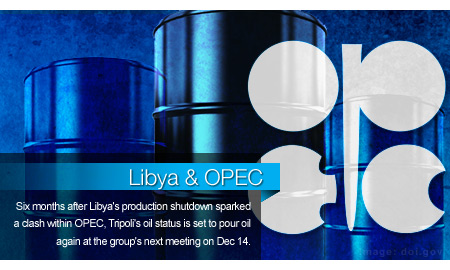Libyan Oil Bristles OPEC Once More

LONDON/DOHA (Dow Jones Newswires), Nov. 14, 2011
Six months after Libya's production shutdown sparked a clash within the Organization of Petroleum Exporting Countries, Tripoli's oil status is set to pour oil again at the group's next meeting on Dec 14. This time it's not because Libyan barrels are out but because they are back on the market.
Following a swift return of the country's production, a split has resurfaced within the Organization of Petroleum Exporting Countries between members like Kuwait which believe the market still requires extra oil and those like Iran which want other members to cut their output.
"The market still needs more oil even with the return of the Libyan oil," Kuwait oil Minister Mohammad Al-Busairi said Sunday, as he announced his country had boosted production above 3 million barrels a day.
The remarks came after Rostam Ghasemi, Iran's oil minister and OPEC's current president, on Friday said "we will tell members of the organization that increased their production that given that Libya's production has returned" they need to reduce their oil flows.
In June, Gulf states led by Saudi Arabia advocated a production boost as global oil demand was increasing amid the loss of Libyan supplies. They clashed with an Iran-led group that opposed the move because of an uncertain outlook for the global economy. After the meeting collapsed without an agreement, the Saudi-led coalition boosted its production in a lock-step move with global oil demand.
Though nobody expects the December meeting to be as acrimonious, the return of Libyan oil is reviving differences regarding demand and supply that had narrowed in recent weeks.
Libya's oil head Nuri Berruien said Thursday that the country's production would be back to half of its prewar level of 1.6 million barrels a day by the year's end, twice as fast as some experts had forecasted.
Such a return has triggered fears in Iran and other countries that markets could be oversupplied and prices may fall if other members don't cut production.
However, in the short term, OPEC's most recent statistics don't suggest any need to rush to the panic button.
Based on its latest monthly report, the group's production in October was about 750,000 barrels a day short of the average demand it sees for its crude in the fourth quarter.
Meanwhile, U.S. commercial oil inventories have been wearing thinner --down by 9.8 million barrels in October, suggesting the market is still slightly tightening despite Libya's return. But at the same time, continuous concerns in the euro zone show OPEC will still face a balancing act in the coming months. The group has downgraded its global oil demand growth forecasts four times in recent months and, although it didn't cut its prospects this month, has warned it could slash them again.
Furthermore, in the first half of 2012, amid lower seasonal consumption, demand for OPEC crude is expected to fall by over 1.3 million barrels a day compared to the fourth-quarter to an average of 29.29 million barrels a day. That's higher than OPEC's current production and will likely come amid higher Libyan production. So the numbers will likely give ammunition to those in the group calling for a reduction of Gulf production.
"The Saudis will cut whether they like it or not," said an OPEC delegate with a country that opposed an increase in June. "The conditions in the market dictate that."
Copyright (c) 2011 Dow Jones & Company, Inc.
WHAT DO YOU THINK?
Generated by readers, the comments included herein do not reflect the views and opinions of Rigzone. All comments are subject to editorial review. Off-topic, inappropriate or insulting comments will be removed.
- How Likely Is an All-Out War in the Middle East Involving the USA?
- Rooftop Solar Now 4th Largest Source of Electricity in Australia
- US Confirms Reimposition of Oil Sanctions against Venezuela
- EU, Industry Players Ink Charter to Meet Solar Energy Targets
- Analyst Says USA Influence on Middle East Seems to be Fading
- Russian Ships to Remain Banned from US Ports
- Brazil Court Reinstates Petrobras Chair to Divided Board
- EIB Lends $425.7 Million for Thuringia's Grid Upgrades
- Var Energi Confirms Oil Discovery in Ringhorne
- Seatrium, Shell Strengthen Floating Production Systems Collaboration
- An Already Bad Situation in the Red Sea Just Got Worse
- What's Next for Oil? Analysts Weigh In After Iran's Attack
- USA Regional Banks Dramatically Step Up Loans to Oil and Gas
- EIA Raises WTI Oil Price Forecasts
- How Likely Is an All-Out War in the Middle East Involving the USA?
- Venezuela Authorities Arrest Two Senior Energy Officials
- Namibia Expects FID on Potential Major Oil Discovery by Yearend
- Oil Markets Were Already Positioned for Iran Attack
- Is The Iran Nuclear Deal Revival Project Dead?
- Petrobras Chairman Suspended
- Oil and Gas Executives Predict WTI Oil Price
- An Already Bad Situation in the Red Sea Just Got Worse
- New China Climate Chief Says Fossil Fuels Must Keep a Role
- Oil and Gas Execs Reveal Where They See Henry Hub Price Heading
- Equinor Makes Discovery in North Sea
- Macquarie Strategists Warn of Large Oil Price Correction
- DOI Announces Proposal for Second GOM Offshore Wind Auction
- Standard Chartered Reiterates $94 Brent Call
- Chevron, Hess Confident Embattled Merger Will Close Mid-2024
- Analysts Flag 'Remarkable Feature' of 2024 Oil Price Rally


